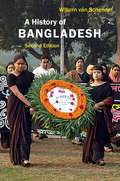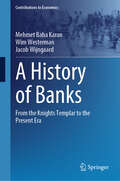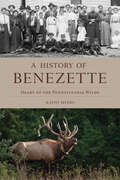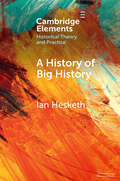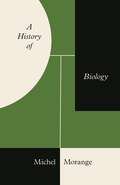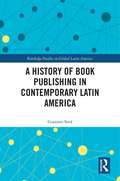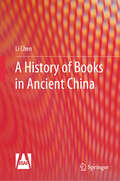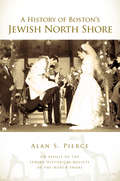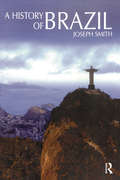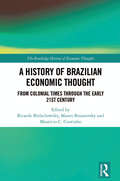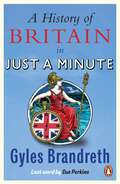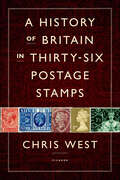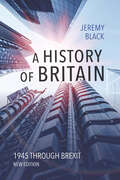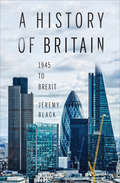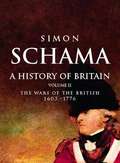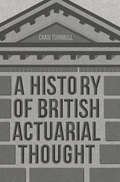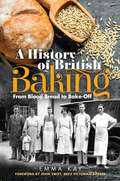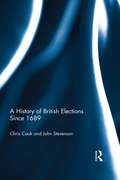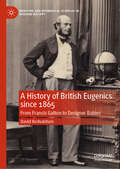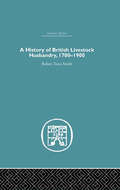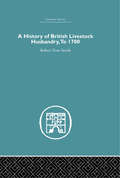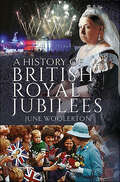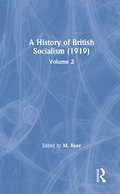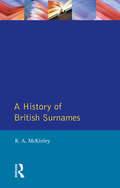- Table View
- List View
A History of Bangladesh
by Willem van SchendelBangladesh did not exist as an independent state until 1971. Willem van Schendel's state-of-the-art history navigates the extraordinary twists and turns that created modern Bangladesh through ecological disaster, colonialism, partition, a war of independence and cultural renewal. In this revised and updated edition, Van Schendel offers a fascinating and highly readable account of life in Bangladesh over the last two millennia. Based on the latest academic research and covering the numerous historical developments of the 2010s, he provides an eloquent introduction to a fascinating country and its resilient and inventive people. A perfect survey for travellers, expats, students and scholars alike.
A History of Banks: From the Knights Templar to the Present Era (Contributions to Economics)
by Mehmet Baha Karan Wim Westerman Jacob WijngaardThis book provides an overview of monetary history from the perspectives of the financial intermediaries who shaped it. Starting from the Knights Templar and ending with contemporary national banking champions, it presents several case studies that demonstrate how banks from around the world have revolutionized both their operations and the markets they operate in. The text holds a plea for democratic and transnational financial intermediation systems. It appeals to students and scholars of economic history as well as to anyone interested in the history of banking and finance.
A History of Basketball in Fifteen Sneakers
by Russ BengtsonA celebration of the iconic shoes and superstars who have defined the sport for decades, A History of Basketball in Fifteen Sneakers tells the story of hoops as only shoes can. The ultimate book for both hoops fans and sneaker obsessives, A History of Basketball in Fifteen Sneakers is an exciting and fascinating look at the sport written with authority and experience by former Complex and SLAM magazine editor Russ Bengtson. From primeval Converse Chuck Taylor All Stars to baroque Reebok Pumps and myth-making Air Jordans to super-high-tech Nike Adapt BBs, each chapter breaks down how a specific sneaker defined an era of basketball, transformed the culture, or changed the game. With full-color sneaker photographs and detailed illustrations throughout, the book is a kaleidoscopic celebration of the players, styles, and iconic moments that have shaped hoops both on and off the court. Topics include: Walt Frazier's PUMA Clydes and the New York City street game; Michael Jordan's first signature Air Jordan and the birth of the modern global basketball superstar; Nike Air Swoopes and the evolution of the women&’s game; sneaker tech and the rise of retro; and much more.
A History of Benezette: Heart of the Pennsylvania Wilds (Brief History)
by Kathy MyersFounding the Pennsylvania Wilds and Preserving Elk Country The village of Benezette is ground zero for the famous elk herd of the Pennsylvania Wilds. Before becoming a popular ecotourism destination, the community was a quiet village with a hardworking ethos. The region's first settlers arrived in the 1780s, looking for new frontiers and economic opportunities. Reuben Winslow purchased more than three hundred acres of land along the Bennett's Branch of Sinnemahoning Creek and, by 1844, had laid down the town's lots as the founder of Benezette. The arrival of the Pennsylvania Railroad in the late 1800s fueled the rise of local industry such as timber and coal. Nearby villages such as Weedville, Caledonia, Medix Run, Summerson and others looked to Benezette as the center of the of the region while developing their own communities. Author Kathy Myers presents the history of Benezette and its influence in the heart of the Pennsylvania Wilds.
A History of Big History (Elements in Historical Theory and Practice)
by Ian HeskethBig History is a seemingly novel approach that seeks to situate human history within a grand cosmic story of life. It claims to do so by uniting the historical sciences in order to construct a linear and accurate timeline of 'threshold moments' beginning with the Big Bang and ending with the present and future development of humanity itself. As well as examining the theory and practice of Big History, this Element considers Big History alongside previous largescale attempts to unite human and natural history, and includes comparative discussions of the practices of chronology, universal history, and the evolutionary epic.
A History of Biology: A History Of The Molecular Revolution
by Michel MorangeA comprehensive history of the biological sciences from antiquity to the modern eraThis book presents a global history of the biological sciences from ancient times to today, providing needed perspective on the development of biological thought while shedding light on the field's upheavals and key breakthroughs through the ages. Michel Morange brings to life the dynamic interplay of science, society, and biology’s many subdisciplines, enabling readers to better appreciate the interdisciplinary exchanges that have shaped the field over the centuries.Each chapter of this incisive book focuses on a specific period in the history of biology, describing the major transformations that occurred, the enduring scientific concerns behind these changes, and the implications of yesterday's science for today's. Morange covers everything from the first cell theory to the origins of the concept of ecosystems, and offers perspectives on areas that are often neglected by historians of biology, such as ecology, ethology, and plant biology. Along the way, he highlights the contributions of technology, the important role of hypothesis and experimentation, and the cultural contexts in which some of the most breathtaking discoveries in biology were made.Unrivaled in scope and written by a world-renowned historian of science, A History of Biology is an ideal introduction for students and experts alike, and essential reading for anyone seeking to understand the present state of biological knowledge.
A History of Book Publishing in Contemporary Latin America (Routledge Studies in Global Latin America)
by Gustavo SoráThis book presents a cultural history of Latin America as seen through a symbolic good and a practice – the book, and the act of publication – two elements that have had an irrefutable power in shaping the modern world. The volume combines multiple theoretical approaches and empirical landscapes with the aim to comprehend how Latin American publishers became the protagonists of a symbolic unification of their continent from the 1930s through the 1970s. The Latin American focus responds to a central point in its history: the effective interdependence of the national cultures of the continent. Americanism, until the 1950s, or Latin Americanism, from the onset of the Cold War, were moral frameworks that guided publishers’ thinking and actions and had concrete effects on the process of regional integration. The illustration of how Latin American publishing markets were articulated opens up broader and comparative questions regarding the ways in which the ideas embodied in books also sought to unify other cultural areas. The intersection of cultural, political and economic themes, as well as the style of writing, makes this book an interest to a wide reading public with historical and sociological sensitivity and global cultural curiosity.
A History of Books in Ancient China
by Li ChenThis book presents a study of the history of ancient Chinese books, not only highlighting specific aspects of the ontology of book history, such as printing and publishing, but also analyzing the internal and external causes of the development of book undertakings from a macro-perspective. Placing the development of and changes in the history of books in the context of social development, it investigates its interaction with politics, economy, society, education, and religion, especially with the big culture, and constructs a book-centered history of ancient Chinese culture.
A History of Boston's Jewish North Shore (American Heritage)
by Alan S. Pierce Jewish Historical Society of the North ShoreForced to flee the brutal pogroms of Europe, Jewish immigrants sought refuge in the beauty of Boston's North Shore. Drawing on their artisan skills, many found work in the tanneries of Peabody and the shoe factories of Lynn, while other enterprising Jews established their own businesses in Salem and Beverly- from butcher shops and groceries to newspapers. Alongside fellow members of the Jewish Historical Society of the North Shore, Alan Pierce has carefully assembled a collection of personal histories from generations of Jewish families. Celebrating the rich flavors of Jewish culture, these accounts capture familiar faces, such as renowned athlete Herb Brenner, and recognizable landmarks like the Kernwood Country Club and the Dolphin Yacht Club, innovative establishments open to all regardless of race or religion. With entrepreneurial spirit, a little determination and plenty of faith, the North Shore's storied Jewish communities have etched enduring marks on its streets and in its synagogues.
A History of Brazil
by Joseph SmithA clearly structured and well-informed synthesis of developments and events in Brazilian history from the colonial period to the present, this volume is aimed at non-specialized readers and students, seeking a straightforward introduction to this unique Latin American country. Divided chronologically into five main historical periods - Colonial Brazil, Empire, the First Republic, the Estado Novo and events from 1964 to the present - the book explores the politics, economy, society, and diplomacy during each phase. The emphasis on diplomacy is particularly original and adds an unusual dimension to the book.
A History of Brazilian Economic Thought: From colonial times through the early 21st century (The Routledge History of Economic Thought)
by Mauro Boianovsky Ricardo Bielschowsky Mauricio C. CoutinhoThis book provides a comprehensive analysis of the evolution of Brazilian economic thought ranging from colonial times through to the early 21st century. It explores the production of ideas on the Brazilian economy through various forms of publication and contemporary thoughts on economic contexts and development policies, all closely reflecting the evolution of economic history. After an editorial introduction, it opens with a discussion of the issue of the historical limits to and circumstances of the production of pure economic theory by Brazilian economists. The proceeding chapters follow the classical periodization of Brazilian economic history, starting with the colonial economy (up until the early 19th century) and the transition into an economy independent from Portugal (1808 through the 1830s) when formal independence took place in 1822. This book is ideal for international and national scholars in social sciences, students in both undergraduate and graduate courses in economics, and any individuals interested in Brazilian economic and intellectual history.
A History of Britain in Just a Minute
by Gyles BrandrethThe story of us - without hesitation, repetition or deviation.Join national treasure and Just a Minute regular Gyles Brandreth on a hilariously addictive romp through British history. This isn't just another history book - there's a catch! From Stonehenge and Boudicca to Megxit and Brexit, each topic is written in 60-second installments, without hesitation, repetition, or deviation.A History of Britain in Just a Minute celebrates key moments, people and places from our past: kings and queens, heroes and villains, triumphs and disasters, inventions and events, battles and bonnets, art, science, literature, entertainment, sport, gossip, and more. Some entries are uninterrupted minutes, while others feature challenges for repetition and even, er...hesitation. You'll even find other Just a Minute panellists occasionally grabbing the pen to regale us with their witty takes on history.You've never heard the history of Britain told quite like this. You'll enjoy every uproarious minute of it.
A History of Britain in Thirty-Six Postage Stamps
by Chris WestStamps tell a story-and Chris West's book is the unique, fascinating tale of Great Britain told through its stamps.Hailed by The Times of London as "a splendid reminder of the philatelic glories of the past," A History of Britain in 36 Postage Stamps tells the rich, layered, and breathtaking history of England through thirty-six of its fascinating, often beautiful, and sometimes eccentric postage stamps. West shows that stamps have always mirrored the events, attitudes, and styles of their time. Through them, one can glimpse the whole epic tale of an empire unfolding. From the famous Penny Black, printed soon after Queen Victoria's coronation, to the Victory! stamp of 1946, anticipating the struggle of postwar reconstruction-A History of Britain in 36 Postage Stamps is a hugely entertaining and idiosyncratic romp, told in Chris West's lively prose.On their own, stamps can be curiosities, even artistic marvels; in this book, stamps become a window into the larger sweep of history.
A History of Britain: 1945 through Brexit
by Jeremy BlackThe British vote to leave the European Union stunned everyone 2016, but was it really a surprise? In this revised and updated edition of A History of Britain: 1945 Through Brexit, award-winning historian Jeremy Black expands his reexamination of modern British history to include the Brexit process, the tumultuous administrations of Theresa May and Boris Johnson, the spectacular failure of Liz Truss, and the early days of Rishi Sunak's premiership.This sweeping and engaging book traces Britain's path through the destruction left behind by World War II, Thatcherism, the threats of the IRA, the Scottish referendum, and on to the impact of waves of immigration from the European Union. A History of Britain: 1945 Through Brexit overturns many conventional interpretations of significant historical events, provides context for current developments, and encourages the reader to question why we think the way we do about Britain's past.
A History of Britain: 1945 to Brexit
by Jeremy BlackA journey through the events of the postwar years that &“makes the outcome of Britain&’s Brexit referendum much easier to comprehend&” (Julian Lewis, member of Parliament). In 2016, Britain stunned itself and the world by voting to pull out of the European Union, leaving financial markets reeling and global politicians and citizens in shock. But was Brexit really a surprise, or are there clues in Britain&’s history that pointed to this moment? In A History of Britain: 1945 to Brexit, award-winning historian Jeremy Black reexamines modern British history, considering the social changes, economic strains, and cultural and political upheavals that brought Britain to Brexit. This sweeping and engaging book traces Britain&’s path through the destruction left behind by World War II, Thatcherism, the threats of the IRA, the Scottish referendum, and on to the impact of waves of immigrants from the European Union. Along the way, Black overturns many conventional interpretations of significant historical events, provides context for current developments, and encourages the reader to question why we think the way we do about Britain&’s past.
A History of Britain: The Wars of the British--1603-1776
by Simon SchamaThe second volume of Simon Schama's A History of Britain brings the histories of Britain's civil wars -- full of blighted idealism, shocking carnage, and unexpected outcomes -- startlingly to life. These conflicts were fought unsparingly between the nations of the islands -- Ireland, England, and Scotland -- and between parliament and the crown. Shattering the illusion of a "united kingdom," they cost hundreds of thousands of lives: a greater proportion of the population than died in the First World War. When religious passion gave way to the equally consuming passion for profits, it became possible for the pieces of Britain to come together as the spectacularly successful business enterprise of "Britannia Incorporated." And in a few generations that business state expanded in a dizzying process that transformed what had been an obscure, off-shore footnote to Europe's great powers into the main event -- the most powerful empire in the world.
A History of British Actuarial Thought
by Craig TurnbullIn the first book of its kind, Turnbull traces the development and implementation of actuarial ideas, from the conception of Equitable Life in the mid-18th century to the start of the 21st century. This book analyses the historical development of British actuarial thought in each of its three main practice areas of life assurance, pensions and general insurance. It discusses how new actuarial approaches were developed within each practice area, and how these emerging ideas interacted with each other and were often driven by common external factors such as shocks in the economic environment, new intellectual ideas from academia and developments in technology.A broad range of historically important actuarial topics are discussed such as the development of the blueprint for the actuarial management of with-profit business; historical developments in mortality modelling methods; changes in actuarial thinking on investment strategy for life and pensions business; changing perspectives on the objectives and methods for funding Defined Benefit pensions; the application of risk theory in general insurance reserving; the adoption of risk-based reserving and the Guaranteed Annuity Option crisis at the end of the 20th century.This book also provides an historical overview of some of the most important external contributions to actuarial thinking: in particular, the first century or so of modern thinking on probability and statistics, starting in the 1650s with Pascal and Fermat; and the developments in the field of financial economics over the third quarter of the twentieth century. This book identifies where historical actuarial thought heuristically anticipated some of the fundamental ideas of modern finance, and the challenges that the profession wrestled with in reconciling these ideas with traditional actuarial methods. Actuaries have played a profoundly influential role in the management of the United Kingdom’s most important long-term financial institutions over the last two hundred years. This book will be the first to chart the influence of the actuarial profession to modern day. It will prove a valuable resource for actuaries, actuarial trainees and students of actuarial science. It will also be of interest to academics and professionals in related financial fields such as accountants, statisticians, economists and investment managers.
A History of British Baking: From Blood Bread to Bake-Off
by Emma KayA cultural and social history of Britain’s breads, cakes, and pastries through the ages, from the author of Dining with the Victorians.The Great British Baking Show and its spinoffs are a modern-day phenomenon, but the British, of course, have been baking for centuries—and here, for the first time, is a comprehensive account of how Britain’s relationship with this much-loved art has changed, evolved, and progressed over time.Renowned food historian Emma Kay skillfully combines the related histories of Britain’s economy, innovation, technology, health, and cultural and social trends with the personal stories of many of the individuals involved with the whole process: the early pioneers, the recipe writers, the cooks, the entrepreneurs. From pies to puddings, medieval ovens to modern-day mass consumption, the result is a deliciously fascinating read.
A History of British Elections since 1689
by John Stevenson Chris CookA History of British Elections since 1689 represents a unique single-volume authoritative reference guide to British elections and electoral systems from the Glorious Revolution to the present day. The main focus is on general elections and associated by-elections, but Chris Cook and John Stevenson also cover national referenda, European parliament elections, municipal elections, and elections to the Welsh and Northern Irish assemblies and the Scottish parliament. The outcome and political significance of all these elections are looked at in detail, but the authors also discuss broader themes and debates in British electoral history, for example: the evolution of the electoral system, parliamentary reform, women's suffrage, constituency size and numbers, elimination of corrupt practices, and other important topics. The book also follows the fortunes not only of the major political parties but of fringe movements of the extreme right and left. Combining data, summary and analysis with thematic overviews and chronological outlines, this major new reference provides a definitive guide to the long and varied history of British elections and is essential reading for students of British political history.
A History of British Eugenics since 1865: From Francis Galton to Designer Babies (Medicine and Biomedical Sciences in Modern History)
by David RedvaldsenThis book examines British eugenics from its origins in 1865 to the early 1990s. It considers the two institutions promoting the doctrine: the Galton Laboratory attached to the University of London; and the Eugenics Society. It charts internal and ideological changes across more than a century, seeing eugenics as primarily a political movement. The doctrine had influence on British society and guided adherents ranging from scientists to charitable ladies. The Galton Laboratory published detailed studies of heredity. It transformed itself into a centre for medical genetics after the Second World War. As early as the 1920s, the Eugenics Society was the mainspring of the doctrine, formulating what became the British version of an international ideology. It began as applied social Darwinism, later incorporating a greater degree of meritocracy and amelioration. Its support for sterilization in the 1930s eroded the kudos it had gained in policy-making circles. From the 1960s, organized eugenics was especially a forum for learned and popular discussion of biology and sociology. Medical advances after 1970 aided its continuation, notably the growth of assisted reproductive technologies. The book presents British eugenics as mostly shaped by domestic concerns, offering new revelations and interpretations with the capacity to readjust historical thinking. It also covers contemporary bioethical and political issues aligned to eugenics.
A History of British Livestock Husbandry, 1700-1900
by Robert Trow-SmithFirst Published in 2005. Routledge is an imprint of Taylor & Francis, an informa company.
A History of British Livestock Husbandry, to 1700
by Robert Trow-SmithFirst Published in 2005. Routledge is an imprint of Taylor & Francis, an informa company.
A History of British Royal Jubilees
by June WoolertonAs Queen Elizabeth II became the only British Monarch to rule for seventy years, she marked the historic moment with a simple message, promising to continue her lifetime of service. But while her Jubilee day was quiet, it was merely the start of a year long celebration that would see millions around the world join the royal party. Jubilees have become regular events in The Queen’s long reign but they are a relatively modern idea which only really took hold in the reign of King George III. Initially rejected by many as a frivolity, the first royal Jubilee became a huge success. It was a beguiling mix of pageantry, religious devotion and popular celebrations including street parties that has been copied in the Jubilees that followed. Queen Victoria enjoyed two successful celebrations, including Britain's first Diamond Jubilee, which helped re-establish her popularity and consolidate the Monarchy. King George V turned to the joy of a Jubilee to re-invigorate his country as it recovered from war and economic woes. In the reign of his granddaughter, Elizabeth II, Jubilees have been transformed into modern media events celebrated globally. In A History of British Royal Jubilees, we trace the ever evolving story of these popular celebrations, bringing each of them to life and looking at how they changed the image of royalty and the country itself. This is the story of how Jubilee celebrations have become vital to the success of Britain’s Royal Family and to its place at the heart of a nation.
A History of British Socialism: Volume 2 (Routledge Library Of British Political History Ser.)
by M. BeerThis is volume 2 of the set A History of British Socialism. These volumes study the political thought experienced as a result of the massive transition of the British countryside to capitalist agriculture and capitalist industry.
A History of British Surnames (Approaches to Local History)
by Richard MckinleyAiming to avoid technical terminology, Richard McKinley provides an introduction to the history of hereditary surnames in Britain from their first appearance to the present day. Devoting a chapter to each of the main categories of name, he enables readers to set the facts they discover about their own ancestry, family history and surnames into the context of general surname development. The author deals with those names that originate in England, Wales and Scotland; and since these tend to have their own distinct histories, he discusses developments in each of the three countries separately, wherever appropriate. The book uses the study of surnames to illuminate social history and draws attention to the complex patterns of population mobility that have always characterized British Society. It also describes regional and class differences in surnames, some features of which survive to our own time.
